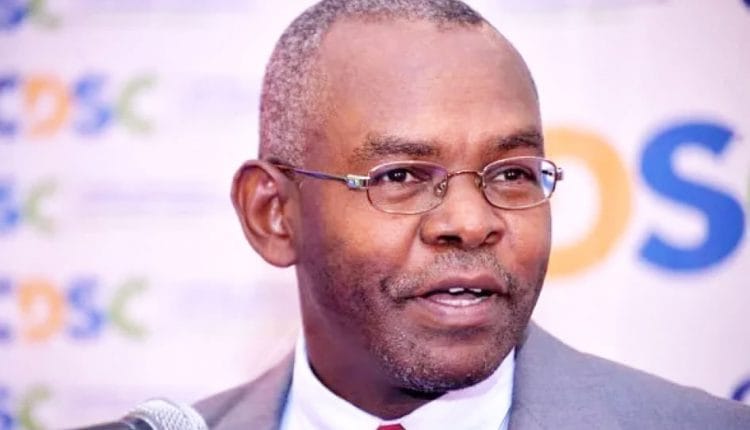CBK: The Promise Of Robust Financial Regulations, Enhanced Monetary Policies And A Thriving Economy
With a career cutting across finance and economic policymaking in the country and abroad, Dr. Kamau Thugge the 10th Governor of the Central Bank of Kenya is a man with the right specifications to turn around the country’s economy, enhance monetary policies and enact robust financial regulations as Moses Cheruiyot writes.
A CBK governor serves a four-year term, renewable once, based on performance evaluations. This critical position requires a deep understanding of economic policies, financial regulations and the ability to make sound monetary decisions.
As the head of the Central Bank, the governor holds significant responsibility in maintaining a stable banking sector, overseeing government expenditures and influencing the economy’s overall health. Dr. Kamau Thugge brings extensive experience and a wealth of knowledge to the role of CBK governor.
Throughout his career, he has held various notable positions, including his previous role as Treasury Principal Secretary. His track record in fiscal affairs and budget policy, along with his expertise in economic matters, makes him a highly qualified candidate for this influential position.
Dr. Thugge’s tenure at the helm of the Central Bank of Kenya raises expectations for effective leadership within the Central Bank of Kenya, considering his background in fiscal affairs. He is well-positioned to address the country’s economic challenges, foster financial stability, and enhance monetary policies.
Furthermore, his experience in government and commitment to transparency and accountability will play a vital role in shaping the bank’s future operations.

What does the CBK do?
The Central Bank of Kenya works closely with other financial institutions and government entities to ensure a well-functioning economy.
It collaborates with the Kenya Revenue Authority and the Ministry of Finance and Planning to harmonize monetary policies, regulate banking activities and manage the country’s finances effectively. Further, the bank plays a crucial role in influencing interest rates, managing inflation and safeguarding the value of the national currency.
Additionally, CBK’s mandate extends beyond monetary policy. It also oversees the government’s day-to-day expenditure and acts as the custodian of the country’s foreign reserves. By effectively managing the banking sector, the CBK influences interest rates, controls inflation, and maintains a stable financial environment conducive to economic growth.
Its regulations and policies shape the business landscape and have a profound impact on both local and international investors.
While the ministry sets the broader financial framework, the Central Bank of Kenya’s primary responsibility lies in executing and implementing these policies, overseeing the banking sector and controlling the money supply to maintain stability.
Effective management of the Central Bank of Kenya is essential for the country’s economic well-being. Thus, a highly qualified governor, brings extensive knowledge, experience and leadership skills to guide the bank’s operations successfully.
That implements that, the governor’s position requires exceptional leadership skills, extensive knowledge of economics and finance, and the ability to make critical decisions that impact the nation’s economy.
With a competent leader at the helm, the bank can effectively regulate the financial sector, promote economic growth and mitigate risks, thereby benefiting both individuals and businesses across Kenya.
What to expect of the CBK Governor…
The appointment of Dr. Kamau as the CBK governor is rooted in his proven competence, expertise and track record. His successful tenure as Treasury Principal Secretary, coupled with his role at the State House, showcases his ability to handle complex financial matters effectively. The expectation is that he will bring his wealth of experience to lead the CBK with integrity, ensuring stability and growth in Kenya’s economy.
As he settles in the role of CBK governor, the expectations for his leadership remains positive despite the economic challenges. Dr. Kamau Thugge is expected to prioritize stability, implement effective monetary policies, and guide Kenya towards sustainable economic growth, benefiting both the banking sector and the country at large considering the weakening shilling.
In terms of Kenya’s economy, it is important to note that the government allocates budgets to various sectors to fund public services, infrastructure development and social programs.
The approximate cost of the Kenyan economy is determined by these budgets and efficient management of financial resources is crucial to ensure optimal utilization and sustainable economic growth. Dr. Kamau Thugge’s tenure holds the promise of robust financial regulations, enhanced monetary policies and a thriving economy that benefits all Kenyan citizens.
The assignment…
Kenya’s GDP growth is set to slow in the third quarter of 2023 as compared to that of 2022 as private consumption is also likely to brake, owing in part to tax hikes, an economic growth forecast report has revealed. Economists estimate the economic output to have slowed in the second quarter ended June, predicting that the trend could persist for the remainder of the year 2023.
The Kenya Kwanza administration is banking on the full enforcement of the tax hikes, including doubling value added tax on fuel to 16 percent, to narrow the fiscal deficit from an estimated 5.8 percent of gross domestic product last financial year ended June to a projected 4.4 percent in the current year. Economic observers opine that the tax hikes could drag down consumption and, ultimately, lower the return on investment in businesses.
Central Bank of Kenya (CBK) Governor Kamau Thugge had on July 17th warned that Kenya has run out of room for spending cuts and that the success of the country’s fiscal consolidation largely hinges on the increased taxes which include a 1.5 percent housing levy on monthly pay for workers.
Despite the difficult assignment, the man at the helm is expected to triumph following his vast experience and knowledge.
Dr. Thugge helped to design and implement various laws including the Public Finance Management Act, the Commission on Revenue Allocation Act, the Independent Officers (Appointment) Act, the Public Procurement and Disposal of Assets Act, and many more. In these roles, he also served on various boards including that of the Central Bank of Kenya, the Monetary Policy Advisory Committee (and later the Monetary Policy Committee), the Kenya Revenue Authority and the Capital Markets Authority.


